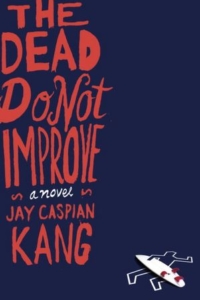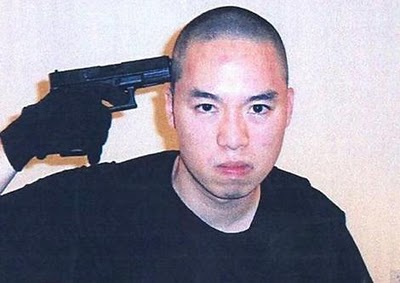Before I say that The Dead Do Not Improve by Jay Caspian Kang is the best book I’ve read in years (and I will say it, bear with me) I should confess that I am the perfect audience for it. Maybe “audience” is not the right word. I am the perfect competition. If you compare the subject matter of The Dead Do Not Improve with the subject matter of the novel I’m writing, they overlap by approximately 71%.
The Dead Do Not Improve my unfinished novel
- San Francisco
- Detectives
- Race and Asian Americans
- The social origins of violence
- The Virginia Tech shooting
- MFA writing
- Fucking hipsters
- San Francisco
- Detectives
- Race and Asian Americans
- The social origins of violence
- The Harvey Milk shooting
- Anti-gay bigotry
- Fucking hipsters
 So when I heard about The Dead Do Not Improve, I said “Fuck me.” I walked to the Strand Bookstore (a place that makes me wish we could selectively castrate the book-buying organs of about 94% of the population) and flipped through The Dead Do Not Improve, saying “Fuck me.”
So when I heard about The Dead Do Not Improve, I said “Fuck me.” I walked to the Strand Bookstore (a place that makes me wish we could selectively castrate the book-buying organs of about 94% of the population) and flipped through The Dead Do Not Improve, saying “Fuck me.”
Writers are famously jealous and territorial people. As I studied Kang’s novel on my subway commute, black pen in hand, I braced myself for the moment when I would shut the book, track him down, rip out his windpipe, and begin the long work of scrubbing The Dead Do Not Improve out of existence.
On page two the protagonist, a Korean-American MFA grad living in San Francisco, goes to a bluegrass festival in Golden Gate Park and says,“Who knew an entire city could be filled with ugly white people?” Does that line give you an immediate and fierce kinship with this book? It did for me. But I’m probably not Kang’s typical reader. He’s writing about the same little Petri dish that I sprang from. One character proves he’s truly local by name-dropping my high school. When Kang writes that the cross street for 218A 39thAvenue is Fulton, I balked. There is no 200 block of 39th Avenue. I know because I grew up on 32nd at Fulton, which is the 800 block. 200 would put you inside the Presidio. If I could finish my damn novel, the world would know these streets as intimately as I do.
The Dead Do Not Improve is a detective story about a murder in San Francisco’s ultra-hip Mission District that forces our protagonist, Philip Kim, to confront his gentrifying neighbors, a surfing cop, elderly porn stars, a militia of ex-hacker vegan hippies, and Chris Isaak. (I hate plot summary so that’s all I’m going to say. For a better outline go here.) Actually it’s not Philip Kim who meets Chris Isaak; it’s the other protagonist, the surfing cop, whose name is Sid Finch. And that’s kind of a problem. The book is split between two protagonists who alternate first- and third-person points of view, and the story is divided into Books, Chapters, and numbered sub-sections — all of which makes the steady onslaught of zingers, cliffhangers, and wackadoodle characters pretty hard to follow.
I should feel happy about this. Kang stole 71% of my material and the result is imperfect, leaving room for me to come along and perfect it. (The dead do not improve, indeed.) But I’m not happy about it. I think this is a fantastic book and everyone should read it. Good books have a way of making their flaws moot, or even useful. This one is jumpy and scattered and high on its own fumes. Just like the hyped-up generation and the ambivalent city it satirizes. I’m cool with that.
I don’t mean to suggest that The Dead Do Not Improve is simply a funny book. But Jesus, listen to this. Kang nails the “barrel-aged indie rock” music of coffee shops and “the tanned, snaggle-faced gym addicts of San Diego.” One character’s college is a“New England factory of private education and goodwill.” On being Korean-American, he says, “Despite my silent, most earnest wishes, people were never embarrassed to tell me about their latest adventures with kimchi.”
On classic literature:
Dead white men invented romantic love, and so it seems reasonable that they would be the best equipped to write about it. If someone were to draft a list of the greatest relationships between a man and, say, the reflection of the moon in a cup of wine, or anything involving mountains or farewells, the top fifty would all be Chinese.
On the latest wave of San Francisco residents:
Across the street, a young couple stared woefully at the crime scene. They lived in one of the gentrifier condos. The guy was always making an effort to talk to the block’s indigenous Mexicans. In two years, neither the guy nor the girl had ever said a word to me because their safety was not compromised by my presence. The girl was the sort of girl who looks best in jeans and a performance fleece. She had an extraordinary ass. The man owned, but rarely rode, a turquoise Vespa.
Kang can write for serious, too. When Sid Finch goes surfing, “A wave welled up, the face going from green to gunmetal gray as the water shifted away from the sun.” And just in general, “Love and cities are always inextricably entwined.”
I don’t know of another writer who’s had the City by the Bay—and all it stands for—so squarely in his crosshairs since Armistead Maupin (and that was a whole different scene). Kang’s social critique is vertically integrated, drawing on subtle social behaviors, specific facts and news items, and the author’s biographical experience. When a work of art manages to be terrifically acute about the comedy of a particular time and place, we tend to treat it as something ephemeral and fleeting. And that was sort of Kang’s intention, as he told the Wall Street Journal:
I wanted to write something that would not feel like it was trying to be timeless, I guess. […] The book tries to deal with race in an as modern a sort of way, as honest as possible. That was my goal. I think that to do that, you have to write about things as they are in the world that people live their lives in now.
Because let me tell you what this book is really about. There is a cult of motherfuckers who are basically worshiping Cho Seung-Hui, the Korean-American kid who killed 32 people at Virginia Tech. These are our villains. But in a perverse way they’re also the good guys. While the media and most Americans were eager to dismiss the Virginia Tech shootings as the work of a crazy person—whose craziness is not even worth questioning, compared to his white counterparts like Dylan Klebold and Eric Harris, because the fact that he’s a creepy Asian kid is, for many people, explanation enough—this cult is digging deeper and re-enacting the whole bloody mess. They’re investigating it, at least. When we dismiss or oversimplify the factors that led to Cho Seung-Hui’s rampage, we only exacerbate the casual racism and deep misunderstandings that made him do it in the first place. It’s no coincidence that Jay Caspian Kang and his main character both fit the exact demographic profile of Cho Seung-Hui. And there comes a moment when they both—like all of us, but more so—have to decide whether, and how, to fight back against some very entrenched social bullshit. Referring to someone who’s been slightly racist toward him, Philip says, “I’ve pictured myself killing him again and again, and sometimes it convinces me that I am sick, but mostly it convinces me that I am a citizen. I hope you can understand why.” When I saw that monstrously beautiful passage I said “Fuck me.”
The Dead Do Not Improve is a detective story whose mystery is not a single act of violence, but a culture that breeds a certain kind of violence. It’s a mystery that will never be solved to our collective satisfaction, so it’s fitting that the novel eventually sputters out in anger and confusion. Kang is absolutely right to pick at our scabs. These are colossally important and terribly under-examined issues that he manages to write about hilariously. Which is why it’s the best book I’ve read in years. (There, I said it.)
Brian Hurley is a former editor at Oxford University Press, the founder and co-editor of Fiction Advocate, and the author of the Critical Hit Awards — a monthly prize for book reviews — at Electric Literature.
This post may contain affiliate links.









